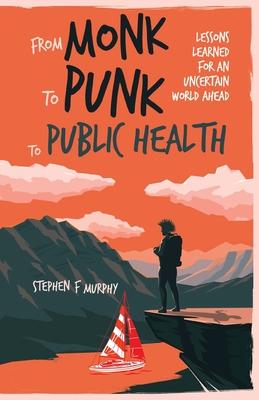From Monk to Punk to Public Health: A personal life journey recounting experiences that shaped me, in which others might find echoes in their own lives. The siren song of organized religious life at a very early age ending in disenchantment and a rebound to punk rock, theatre, and UK politics in the Thatcher years. Searching for my purpose in travel through Brazil, the South Atlantic, and the Caribbean. Finding direction and success in PR, advertising, and health communications in the US. Getting married, having a child, getting divorced, and trying to understand why. Through reflection coming to terms with and finding fulfillment in who I am. Not a story of great disasters or great triumphs but an authentic account of diverse life experiences and lessons learned along the way.
The author takes us on a journey from his childhood upbringing in Sheffield, England, his decision to join a Catholic teaching order, the De La Salle Brothers, as a trainee brother or monk, onwards to his Bristol college days. There he managed the college entertainment and arts program, hiring the top bands of the mid-seventies, just as the punk rock scene was emerging in the UK. He produced rock concerts with the Jam, Annie Lenox, and the Sex Pistols and traditional artists such as Procul Harum and Al Stewart.
Tiring of the punk music scene and the violence, he moved into the London arts and theatre world of the early 1980s, working at organizations such as InterAction and the Half Moon Theatre, which provided early theatre experience to actors such as Daniel Day-Lewis, Simon Callow and Alfred Molina. He co-founded the National Campaign for the Arts as Thatcher cut funding. He co-produced a show at the Royal Festival Hall featuring Emma Thompson protesting the Conservative government's policy of limiting the local government's ability to raise taxes. He later led the publicity campaign for the 1986 50th anniversary of the Jarrow unemployment march.
The Thatcher years cut funding for the arts, which led to a layoff. Looking for a new direction, he traveled to Rio Janeiro, where he taught English and marveled at the warm openness of Rio compared to the then-closed and depressed psyche of Britain. Journeying around the country, in Bahia, he met with Capoeira dancers and spent an overnight in jail, then met up with a sailboat captain and enlisted as crew. They sailed from Bahia to Natal, Trinidad, Grenada, and Antigua. The experience helped him navigate not just the ocean but a later life in America.
He recounts the story of his landing in America, his decade of work in PR and radio, and a decade building a company that focused on health communications and Hispanic outreach. One campaign backed the bipartisan passed Children's Health Insurance Program and led his first White House visit. His experience in health communications turned into an opportunity to grow the government contract business at WebMD, the leading health information website. There he has sold millions of dollars of health communications services to the US Federal Government, from advertising to physician training in topics as diverse as COVID, HIV, substance use disorder, cancer, and older driver safety.
While the book is one man's account of life experiences, readers familiar with the Thatcher years, the arts, and the music of the 70s and 80s in the UK will find many familiar references in this story. PR professionals will resonate with his early days in Washington, DC, pitching agencies on the merits of radio and recording and distributing soundbites for dozens of political, association, and corporate causes. Many will take comfort in recognizing aspects of a life journey rich with lessons learned about religion, technology, culture, and government, from Thatcher to Trump.
